

 | ||
 |
Sophie's Choice |
 |
 | ||
 |
With the falling cost of making CDs and the increasing access to modestly priced software, it is now relatively easy to produce a run of a few hundred CDs, which, in terms of presentation and sound, often stand fair comparison with the big names. However, there's not a great deal of attraction in having a delicately crafted piece of art unless there is an audience to appreciate it (Emily Dickinson aside). The result is that aspiring songwriters send out their CDs to all and sundry in the hope of getting a good write-up which they can then quote from on their press material and on their web site. Triste seems to be that "sundry" and a steady stream of CDs drop through the letterbox - some are totally inappropriate to the magazine in terms of genre, others are sloppily packaged. Sophie Parks has taken on the valuable job of sifting through some of the more appropriate CDS and providing her thoughts. A difficult task - hence Sophie's Choice (apologies to the late William Styron). |  |
 | ||
 |
 |
|
 | ||
 |
Jenny McCormick - English Country Garden - Square Peg |
 |
 |
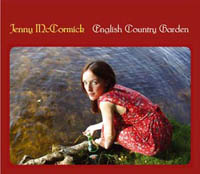 The second track, ‘Don’t Be Cruel’, makes the comparisons with Kate Rusby understandable. Here the real Northern vowels come out, more so than when Jenny speaks. Although the scene depicted in the song is very English country, with haystacks and horizons, the banjo and harmonica introduce an American folk and country twang which is to quietly resonate throughout Jenny’s repertoire. Similarly, ‘The House Carpenter’ is very much derived from English balladry, but the lead guitar licks are essentially American. Again, the woody double bass, creaking and groaning, is like a prevalent warning underneath. For Jenny, it’s not about virtuoso playing or clever lyrics. It’s about telling it like it is, and emphasising meanings through subtle musicianship. Highlight of the album is also the highlight of her live set, ‘Hey Joe.’ Its country swing touches on Lynyrd Skynyrd, as the bass is no longer premeditating and ominous but instead playfully skips between notes. Most fascinating, though, is the way in which the singer intonates the title line. Jenny’s voice soars between the most unexpected pitches so that it is impossible to sing along for the first few listens at least. The album also has a naval theme, with a few of the songs conveying tales of woe from the sailors and their lovers they leave behind. Here, the music gently lilts and Jenny’s breath bounces as over waves. The songs are often desperately sad, but somehow you know Jenny’s not a dark, brooding Morrissey type. She’s just someone who can empathise well with her subject matter.
|  |
 |
 |
|
 | ||
 |
Darren Fisher - Feathers and Oak Trees - Evermoregreen |
 |
 |
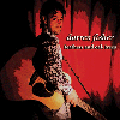 More surprising still is his voice: a glimpse of the lyrics beforehand and earnest, gravely vocals are instantly expected, as his words invoke pastoral scenes of soul-searching. However, it is more highly pitched and strains into an uncomfortable vibrato at times. Sadly, it is reminiscent of Saturday night talent show fodder and sits awkwardly with the subject matter.
|  |
 |
 |
|
 | ||
 |
Stuart O'Connor- Autonomous Debut - Self-released |
 |
 |
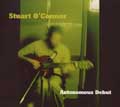 However, track four, ‘Make A Little Silence’, rocks the boat and we are transported to the nearest wine bar to an artist who is now playing for his supper. O’Connor’s voice sounds entirely different to the opening tracks and appears to be manipulated in to faux-pained expressions. The arrangement is poor, too, as the saxophone meanders carelessly when it should be more anchored to the repetitive guitar. In fact, Stuart, scrap the sax altogether, as it only adds to the wine bar ambience. As the album continues, O’Connor experiments with hip hop rhythms, subtle percussion, electronics and expletives. And the finished product is, frankly, irritating. With so many singers wielding guitars stage left right and centre, one realises the need to set themselves apart from the rest. However, trying too hard – with computer generated whirs and bleeps – is only too evident. His earnest lyrics and self-indulgent finger picking would do well at open mics down at the local, and he’s less likely to be able to transport his whirs and bleeps there, too.
|  |
 |
 |
|
 | ||
 |
Mark Wilson - Play With Fire - Slowburn Promotions |
 |
 |
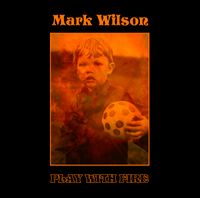
|  |
 |
 |
|
 | ||
 |
Undercurrent - Steve Robinson -Sunshine Drenchy Records |
 |
 |
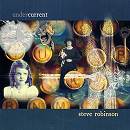 Sadly, it’s not just the lyrics which will come under fire. You know the moral upstanding pillars of the community who go in to schools with their guitars to teach counting songs to children? If Steve Robinson is not currently employed in this arena, then please, somebody, you’ve got an ideal candidate who will enjoy singing to bored sixteen year olds about Chlamydia. A tame voice, lined with enthusiasm and happy-go-luckiness, and a mean guitar lick learned through hours of discipline in the bedroom is the real undercurrent on this album.
|  |
 |
 |
|
 |
Joseph Topping - Take Me Home - Independent |
 |
 |
 Nevertheless, the album begins with rousing love song "Raise the Roof" which seems so lighters-and-hands-in-the-air it is an unusual song with which to open. And something which seems to fit with this is the artist's voice: it is actually startling how much Topping sounds like Ronan Keating, with his delicate tremble of vibrato and occasional wistful tone. This doesn't matter, though, as the arrangement and guest musicians set Take Me Home very much apart from what Keating has ever done or is likely to do; a fact on which Topping seems to deliberate, shown by the word painting and earthy fiddle solos from Chris Leslie, for example. Unfortunately, any sense of pace or excitement is lost after the first track finishes, as the poetic lyrics take over and two indistinct ballads follow. For Topping, it is the traditional singer songwriter material which takes precedence across this album, the man with the guitar lamenting over one tribulation or another, and any real sentiment is lost to the listener because nothing new or innovative is communicated. The title track also follows this formula, leaving the listener quizzical as to why this album is named after such an ordinary song. Yet there is some consolation, and there are three excellent tracks on the album. The best, above all, is the fourth track, "Heaven Help The One You Love", welcome respite after the tedium of tracks two and three. Although heavily influenced by American folk and country, there is a distinct English morris jog from the fiddle and accordion which later escalate into jazzy licks and solos, inevitably provoking audiences into, at the very least, a thundering of tapping toes. The wealth of vocals from Chris While and Julie Matthews seem to give confidence to Topping as he growls and accentuates his own vocals. Although there is nothing particularly groundbreaking about his offering, Joseph Topping executes his music well. It feels, at times, as though he cannot quite decide which route to take - his stronger, more grasping voice, or his fragile whisperings, for example, and if the two weren?t used so interchangeably it may seem as though he were two very different vocalists.
|  |
 |
 |
|
 |
Mark Abis - Changing Inside - Independent |
 |
 |
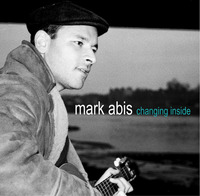 Similarly, the album continues for another two songs after track nine, "Stronger Than Desire", which at the time seemed a further candidate for the last track. Pace is maintained throughout this track by the guitar, despite the speech-like vocals making it seem slow. The temptation to break out into full blown, heavy dance is there, especially when the texture grows seemingly with each verse, but the heartbeat bass drum keeps all under control. Once the effects begin, the distortion and feedback of guitar and later, the synth, and the harmonica interrupts with a lazy stab at centre feature, this track is confirmed to be a kind of chill out, the sample and effects mimicking the city sounds of which Abis narrates. Again, a perfect chance to fade out into a satisfactory finish. Come to think of it, track three, "Memory", thankfully not homage to Lloyd-Webber, could also compete with the aforementioned as closing track. It is the chorus, the sauntering repetition of "I want you/I want you", and the rising drums which invokes images of an enraptured audience, clutching each other and singing along, as a closing track often does. All this talk of closing tracks doesn't mean I spent the entire time hoping the record would come to an end. It's just Marc Abis goes for that sound so many aim to emulate: poignant lyrics and a rousing chorus, meaning his listeners really take something away with them. So what of the chosen final track? Well, the album comes clean again after those previous, and "Pink Tulips" is of more traditional singer-songwriter ground. The influence of Bob Dylan is especially prolific here, particularly in his nonchalant pronunciations and the manner in which he fits the lyrics to the music. It's the more experimental material, tracks seven to nine, which demands more attention from the listener, and it is on this that Abis should spend more time.
|  |
 |
 |
|
 |
Jugopunch - Where Are We Now? - Punchmusic |
 |
 |
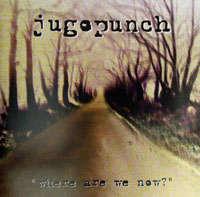 But Jugopunch are completely in control. There are no Shane MacGowan antics here, despite the occasional vocal reminder. The pace is quick, the wit is quicker and the musicianship is spot on. Jugopunch are the kind of band you would see busking to large crowds, with jangly guitar and boot-stomping beats, and somehow they’ve maintained the live passion in the studio. Album highlight is 'Sweet Nancy Rose', a bluesy lament about the atrocity of war disguised as a raggedy, swinging warning about the lure of Nancy Rose. The title Where Are We Now? might have been devised to excuse the musicians from their inebriation, but it might well refer to the mix of traditions. The virtuoso harmonica and banjo immediately transport you to American folk, country and bluegrass, whilst much of the structure is derived from Blues verandas. The listener spends a summer in Sligo whilst English folk storytelling pervades lyrical choices. I like to think this is a result of worldwide busking, picking up bits of local tradition and legend, as well as sharing with fellow musicians. Perhaps it is.
|  |
 |
 |
|
 |
Moot - Holdfast - Independent |
 |
 |
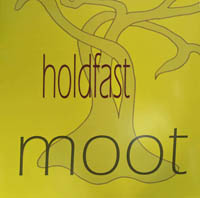 It’s not an intimidating barrage of Manx culture. Holdfast is folk song inspired by the island and delivered by a clean voice from Aalin Clague, plus flute, pipe organ and backing vocals from Breesha Maddrell. But it’s not quite so simple. Interwoven are samples, electronic beats, effects and sounds from the trio’s own fx man, Robert Cain. ‘Wide Open’ is not the best track with which to open. Those folk traditionalists are unlikely to go any further. The electronica isn’t so discreetly infused as it is later on the album, with large chunks of synthesised speech and bare harmonies. There’s little depth in the music given the subject matter. ‘No Cap of Black’ might have been a better choice. The piercing vocals accentuating the word ‘shite’ can’t help but raise a smile, and the tribal beats are later replaced by out-and-out electronica. However, it’s unlikely to take the commercial dance music mainstream by force. It’s more likely to inhabit the same kind of circles as the Peatbog Faeries currently do, namely festivals with a folk vein. There are moments where the listener cringes. Lyrics such as ‘Gorse is glowing, sweetly blowing / cormorants stretching, drying their wings’ might be an accurate description, but can be as easily dismissed as breathy whimsicalities. In fact, Moot may have benefited from altogether stronger vocals. ‘Red Dress’ is a wonderfully unusual tale of an unfortunate woman whose failure to buy a dress ‘so she could be alluring’ leads to a nervous breakdown. The vocals need to portray defiance yet woe, but the voices almost mock the protagonist. Holdfast is an apt title. The musicians have held fast to structure and rigidity, and the result is disappointingly wooden. The electronic element of the music gives the impression that someone has pressed a button and run off to play the acoustic instruments or grab a mic. It rarely comes across as a natural addition, rather more a forcing of traditional and modern.
|  |
 |
 |
|
 |
Kevin House - Gutter Pastoral - Bongo Beat |
 |
 |
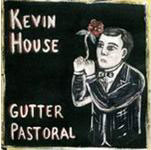 I think to call House a "freak" is both graciously over the top and highly inaccurate. A little eccentric maybe, judging by the only apparent photograph on his website of himself sees him wearing flying goggles so large that it is just possible to make he is male; all other facial features are obscured. More importantly though: his music is not so way off the mark to earn the "freak" label. However, Gutter Pastoral is experimental enough to make the listener sit up and listen, but not so much we are turned off by irreverent and futile noises. The album opens with the best track on the album, "Stories Without Words". Here House employs a distorted effect on his vocals, akin to that of The Strokes, so the track sounds antiquated and eerie. To accentuate this, he uses an array of unusual instruments, funmachine, theremin, vibraphonette and the "earaphone", a rubber ear he sang through to achieve a particular sound he craved, to concoct a mixed wailing sound. This, combined with the vocals, gives the impression that House is locked in an airtight broom cupboard in a haunted house. Perfect, particularly as his lyrics reflect this sinister atmosphere in their childishness. The wailing from the theremin continues into track two, "Twilight in Wilderness", ensuring that the pleasant finger picked guitar, and obvious Nick Drake moments, are off set and made creepy. During this track Kevin "plays" the crickets and birds, another sound effect used subtly and successfully. Now the artist can only imagine the natural surroundings from his locked broom cupboard. From this point, though, Kevin House descends into generic singer songwriter territory, especially with "Rise Up", track five, where he adopts his protest song high horse, and conforms to singer songwriter stereotype of the preacher. The fade out seemingly begins far too early, half way through the song, leaving the only obvious trick, the na-na-na refrain, to end the song. The instrumental which follows reverts back to the experimental, much to my relief. Amongst the electro wizardry, House uses the banjo to jangle lightly above the self-explanatory sounds from the "fogboard", making sure that the title, "Duskpoem", is wholly appropriate. This influences the next track, "Waltzing with the Hellhound", an ideal place to introduce vocals from Be Good Tanya Sam Parton. In an interview with Eye.net, Kevin House concedes that he is fascinated by "the illusion of idea and facade." This is evident in Gutter Pastoral, as his music does not rest with a simple line of music and some well-crafted lyrics. House seeks to invoke a scene or a feeling. Perhaps, given his love of early American recordings, even a time and a place. I was not surprised to learn, then, that the musician is also a visual artist too, mainly preoccupied with circus and sideshow banners. Gutter Pastoral is full of quirks and eccentricities, and it is these which make the album so fulfilling.
|  |
 |
 |
|
 | ||
| ARTICLES LISTING | ARCHIVE | NEW SHOOTS | TRISTE MAGAZINE | HOME |